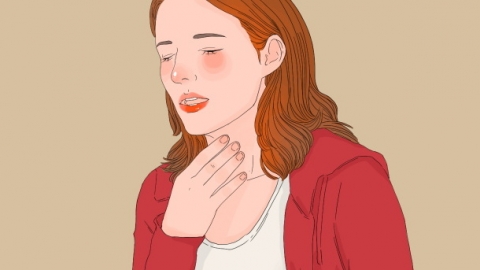How to relieve dry mouth and throat at night while sleeping
Generally, dry mouth and throat at night may be caused by factors such as dry environment, improper diet before bedtime, chronic pharyngitis, rhinitis, diabetes, and others. It is recommended to seek medical advice promptly, identify the underlying cause, and improve symptoms under a doctor's guidance through general management, medication, or other treatments. Specific analysis is as follows:

1. Dry environment: Low humidity in the bedroom causes rapid evaporation of moisture, leading to loss of moisture from oral mucosa and resulting in dry mouth and throat. Using a humidifier in the bedroom to maintain humidity between 40%–60%, placing a glass of warm water beside the bed to drink when thirsty, and avoiding prolonged window ventilation before sleep can help.
2. Improper diet before bedtime: Consuming excessive spicy or salty foods, alcohol, or coffee before sleep can irritate the oral mucosa and accelerate fluid loss. Adjust pre-sleep diet by choosing light and easily digestible foods, avoid eating within one hour before bedtime, refrain from alcohol and coffee, and drink a small amount of warm plain water to moisten the mouth.
3. Chronic pharyngitis: Long-term inflammation irritates the pharyngeal mucosa, reducing secretion. Saliva production also decreases at night, worsening dry mouth and throat, often accompanied by a sensation of a foreign body in the throat. Patients should follow medical advice to use medications such as Qingyan Drop Pills, Pharyngitis Tablets, or Watermelon Frost Throat Lozenges to relieve symptoms.
4. Rhinitis: Nasal congestion forces mouth breathing, allowing air to directly stimulate the oral mucosa and remove moisture, causing dry mouth. Follow medical advice to use nasal sprays such as budesonide nasal spray, mometasone furoate nasal spray, or赛洛唑啉 hydrochloride nasal spray to relieve nasal congestion.
5. Diabetes: Poor blood glucose control leads to increased urination and bodily dehydration. High blood sugar also affects saliva secretion, resulting in dry mouth and thirst, often accompanied by polydipsia (excessive thirst) and polyuria (frequent urination). Patients should follow medical advice to use medications such as metformin hydrochloride tablets, glimepiride tablets, or insulin injection to control blood glucose levels.
In daily life, maintain good oral hygiene by brushing teeth morning and night, rinsing mouth after meals, and minimizing bacterial growth in the mouth. Use a soft-bristled toothbrush to avoid damaging the oral mucosa. Applying lip balm before bedtime can protect the lips and reduce moisture loss. Comprehensive lifestyle adjustments can help improve nighttime dry mouth and throat.




